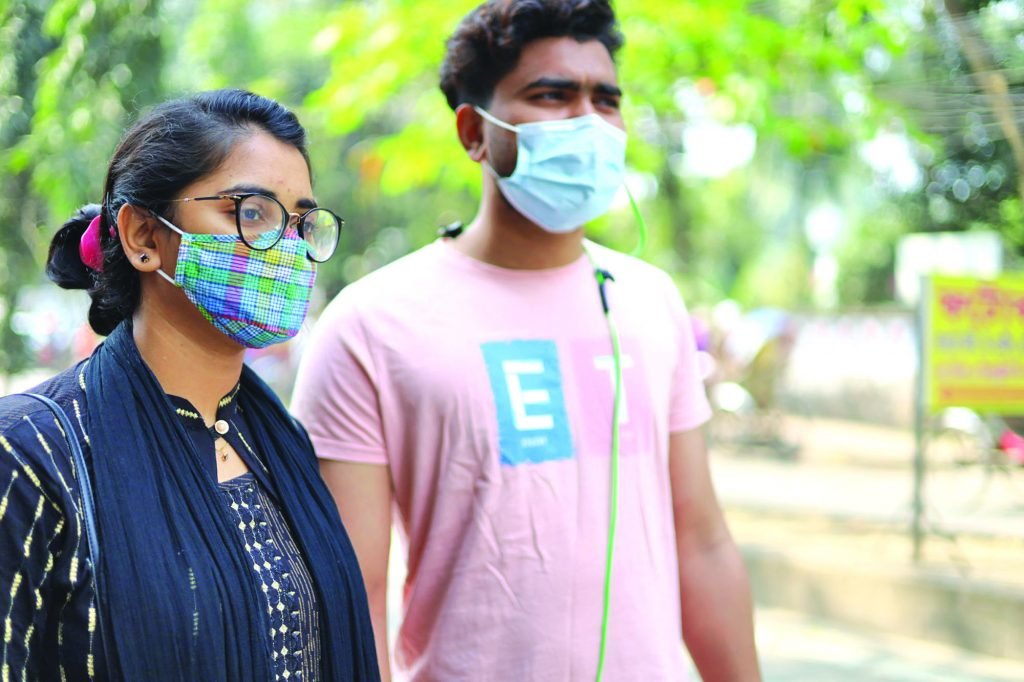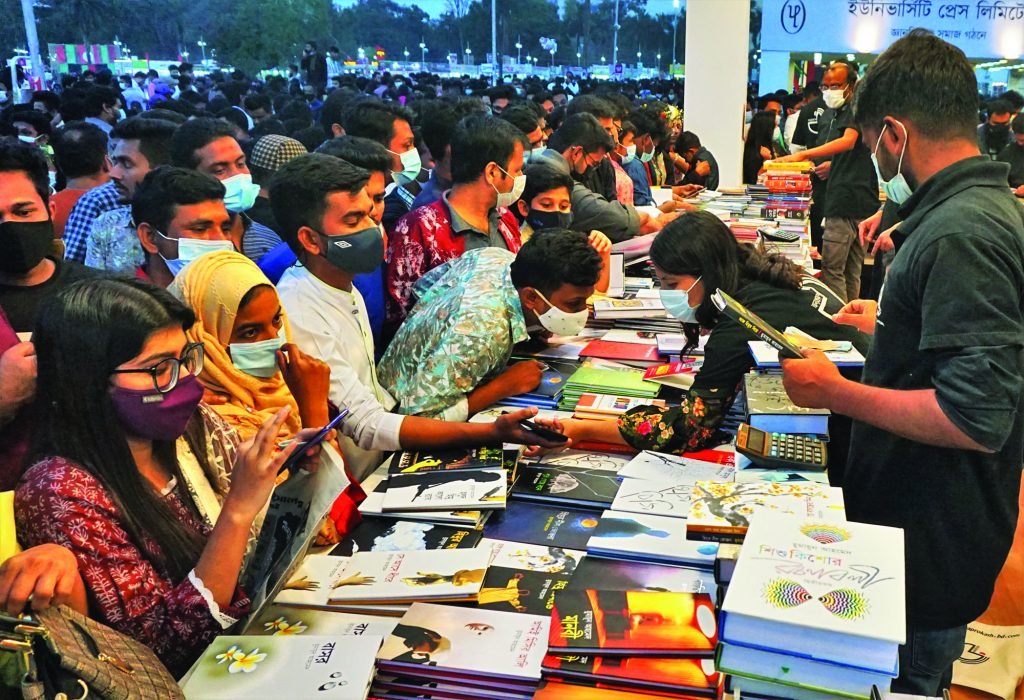The whole world is now in the same boat trying to navigate through the waves of the pandemic. The invisible virus has been raging in every nook and corner of the world including Bangladesh. When there was no vaccination, the world was flat with similar challenges of lives and livelihoods. But with the advent of the vaccines the world was divided sharply into countries with plenty of vaccines and countries with no vaccines. The moral compact of the world, with its slogan of ‘nobody should be left behind,’ just crumbled in front of our eyes. Some developed countries collected excessive numbers of vaccines (some of which even expired) for which the supply chain was dried up for others like Bangladesh which could not procure vaccines despite having money. While the second wave of the more menacing Delta variant of the virus was raging the border areas of Bangladesh, the world community has remained insensitive to the people of Bangladesh by not supplying the needed vaccines even at a competitive cost. The Serum Institute started supplying the vaccine in good spirit. But unfortunately, the corona situation deteriorated so much that the Indian Government had to ban export of the vaccines temporarily. Bangladesh became a victim of this decision despite its signed contract with half the payment already made. The other vaccine producing countries did not step up to fill the void of the disrupted supply chain from India. However, the G7 countries at a Summit in London promised to provide one billion doses of the vaccine to the developing and least developed countries. Despite those uncertainties tried its best to provide vaccines to COVAX Alliance people at severe risk. The IMF Chief has rightly pronounced that access to vaccine is the best economic policy now. As we have been seeing, with increased number of people being jabbed in developed countries, the business confidence has been rebounding with better protection of lives and livelihoods. The latest round of infection of omicron variety has made it abundantly clear that vaccination can indeed make a difference while facing the challenge of the on-going pandemic. In particular, the booster dose of vaccination has become crucial in regaining the business confidence of both the entrepreneurs and consumers.
Though the economy has already started rebounding in some strategic areas including apparel exports, its recovery has been accelerating as we were able to control the virus by mass vaccination and enhanced social awareness of wearing masks and maintaining social distances. Notwithstanding all these predicaments, the Bangladesh economy has been moving on. The latest BBS data reflect that Bangladesh could achieve 6.9% of economic growth in the last fiscal year defying the pandemic. Both exports and imports have been roaring during the last seven months of the current fiscal year indicating that we will surely surpass the targeted 7.2% growth rate, reports Press Xpress
Given this perspective, let us look at the economy of Bangladesh which may be unfolding in the context of its recovery from this menacing virus. Though the economy has already started rebounding in some strategic areas including apparel exports, its recovery has been accelerating as we were able to control the virus by mass vaccination and enhanced social awareness of wearing masks and maintaining social distances. Notwithstanding all these predicaments, the Bangladesh economy has been moving on. The latest BBS data reflect that Bangladesh could achieve 6.9% of economic growth in the last fiscal year defying the pandemic. Both exports and imports have been roaring during the last seven months of the current fiscal year indicating that we will surely surpass the targeted 7.2% growth rate. Most international multilateral agencies are also supportive of this robust growth outlook of Bangladesh economy. The changes that have been taking place in the real sector also supports this growth optimism. Let us, therefore, first look more closely at the changes that are already in motion in some of the critical areas of our economy. We need to pause and look at the contours of these changes that may have impact on the potential shifts of our economy both in the medium and long terms. Several changes are already in motion and many more are to come.
- Investing in agriculture, our major savior

Agriculture has been our strongest comfort zone as it has experienced an eye-catching transformation during the last twelve years or so. The government led by Sheikh Hasina has been particularly forthcoming in providing policy support to this sector. In the process, agriculture has been witnessing unprecedented modernization in terms of mechanization, diversification, innovation of climate-friendly seeds, and phenomenal growth of value-added agriculture. There has been stunning growth in the productivity of not only cereal agriculture but also other farming sub-sectors. Agricultural growth has consistently been over three percent during the last decade. The growth rates of horticulture, milk, cereals, pulses, vegetables, fruits, fish, poultry, and livestock have all been impressive during this period. The agricultural processing industry has also been thriving on the back of this modernized agriculture. Jute and jute products have returned to their rhythm of production and their share in exports has been growing every year. The decline of plastic as a packaging material has also given our natural fibers a boost. The potential of jute product exports is indeed great in the post-COVID world, which is now looking for a green recovery. The price support by the government for agricultural products and positive response by the market have been well-orchestrated. The surplus management by the government in coordination with the market providing necessary price incentives to the farmers has also been strategic. Yet, more efficient supply chain is a must for which we need to commit ourselves for several reforms including further mechanization, crop-diversification, efficient water management for appropriate irrigation, food-processing which increases shelf-life of farm products, reduction of post-harvest waste, promoting agricultural exports, and increasing private investment in agriculture. All this will lead to further modernization of agriculture, creating more jobs and enhance farmers’ income and leading to more robust domestic demand.
2. Prioritizing renewables for increasing the supply of green energy

This pandemic has demonstrated to the world the importance of protecting nature, which cannot take any more of our excessive pressure. So, we need to strengthen environmental protection to build back better. Obviously, transforming the energy sector deserves to be prioritized with a clear focus on how to address climate change challenges. A renewed emphasis on renewable energy is, of course, the most logical area of intervention for the desired energy transformation. Bangladesh is becoming a power surplus country where supply appears to be more than the demand. Unfortunately, the share of renewable energy to total energy still hovers around only 2 per cent compared to 23 per cent in India, which is planning to take it to 40 per cent by 2030. As the leader of the Climate Vulnerable Forum, we have an additional responsibility of pushing the green energy agenda, to show the world that we are morally on a higher ground as we are the victims of climate change. This shift will help reduce the import bill on coal, create new employment opportunities, enhance inflow of new investments, and promote ecologically sustainable growth of the country. The falling price of renewable energy due to cost-effective generation through improved technology has been pushing this shift. This shift has been driving the imperative for major reform of the power sector encompassing the need for deregulation, decentralization, partnership with social entrepreneurs and efficient price discovery. The Mujib Climate Prosperity Plan which has already been initiated could be a game changer in transforming resilience into green recovery and prosperity in alignment with the above shift.
3. Supporting ICT and startups for sustainable growth
The pandemic has already demonstrated the power of digital transformation. Productivity has improved significantly due to the adoption of digital communication and working from home. Digital finance has also become a facilitating factor in making the growth process smarter and inclusive. ICT is going to be the new engine of growth of the country. This will attract more private investment, creating more jobs in both the rural and urban areas. This can make Bangladesh a reliable source for low-cost supply of knowledge-based business solutions. The policy makers should, therefore, strategize investment policies with enough incentives for developing applications using Artificial Intelligence (AI), Machine Learning (ML), robotics, and blockchain technology. Bangladesh must invest more to make itself an innovation hub, with growing startups. The ICT Division, of course, started moving in that direction and investing in creating an ecosystem which is conducive to young entrepreneurs. It also started running a creative fund for encouraging some startups that are at the growing stage. It is also investing in startups at the seeding stage. What is more encouraging is that the central bank of Bangladesh has created a special fund to be implemented through banks for supporting startups with innovative ideas. It has also asked the banks to add on similar amount of funds to support startups.
4. Supporting Fintech and Healthtech
The pandemic has emerged as an opportunity for fintech in Bangladesh. Mobile financial services and agent banking have been flourishing by leaps and bounds as most people prefer to work from home and make digital payments. Even the government is using this facility extensively for cash payment to the beneficiaries of social security programs. Small businesses, particularly the ones supplying food and daily necessities, are thriving because of this financial service. New health-techs are growing rapidly, in the forms of tele-medicine, sales of medicine, fixing appointments with the doctors, admission to hospitals, and counselling services. These are SMEs and deserve to be nurtured by the state and the larger entrepreneurs for developing a future ecosystem of businesses based on leveraging the IT infrastructure. Promoting young firms and innovation for investment in these creative enterprises will be the right move for future expansion of a digital economy in Bangladesh.
5. Invest in supply chain – both local and regional
Developing efficient supply chain, both at the local level and via linking with the global chain by improving forward and backward linkages through modernizing logistics will take Bangladesh to a higher trajectory of designing, production, marketing, distribution, and post-sale support. Such participation in global value chain will lead to greater gains from trade which will enhance the employment opportunities and per capita income of the country. ASEAN’s index of participation in Global Value Chain is about 46 per cent. The shift in global value chain in response to COVID-19 and expansion of exports in the post-pandemic situation will create huge opportunities for Bangladesh. The recent uptake in our export figures clearly points to this possibility. To benefit from that, besides diversifying trade, Bangladesh should move strategically towards regional trade integration and early completion of bilateral free trade agreements with the EU, US, UK and ASEAN.
6. Continue investing in infrastructure
Despite a huge increase in investment in the mega projects, the infrastructure gap remains. However, the push for mega infrastructure projects like the Padma Bridge, metro-rails, deep-sea port and Special Economic Zones have the potential of reigniting the economy and could turn out to be game changers for Bangladesh. The policy makers must look for both private and public investment for such infrastructural development. Simultaneously, we must invest in natural infrastructures like the mangrove forests, wetlands, haor, water bodies, and wind power system, anti-salinity projects etc in the coastal belt to make the green growth process a priority. Both the regulators and government must think in advance of how to mobilize sustainable finance including green bonds/sukuks and green refinance to support green infrastructures.
I can keep on listing such innovative initiatives to make our recovery from the pandemic both green and inclusive. The smart transformation of urbanization to make our cities livable is yet another important policy initiative for green recovery. Ultimately, we will have to combine sustainable production and consumption with nature-friendly lifestyles to make our recovery journey more desirable and sustainable. Above all we must emphasize on good governance, accountability, and transparency, with a sharp focus on gender inequality, to make this transition sustainable. All this, of course will need more money. We will have to be prepared to mobilize more revenue domestically by bringing more people into the tax-net, in addition to mobilizing funds from our non-resident Bangladeshis who are already participating in the capital market including bond market. They could do more if we are a bit more strategic and serious about improving ease of doing business, by upgrading our service processes using digital technologies. Simultaneously, we need to be more proactive to conduct smart economic diplomacy with our development partners so that we can have greater access to low-cost longer-term emergency and conventional financial support from them. Already, Bangladesh has been showing its strength in accessing greater amount of such loans and grants. The quality of implementation of the foreign-aided projects must be further accelerated to take advantage of this low-cost international funding support. This will help release additional fund from the growing pipeline. Also, we want to have greater access to climate fund as Bangladesh is victim of climate change. And this is doable. Indeed, we want to make our Bangladesh and ultimately the world ‘cleaner, greener and safer,’ as described by our Honorable Prime Minister in one of her recent write-ups (The Financial Times, 28 September 2020).

Bangabandhu Chair Professor, Dhaka University and former Governor, Bangladesh Bank. He can be reached at dratiur@gmail.com


